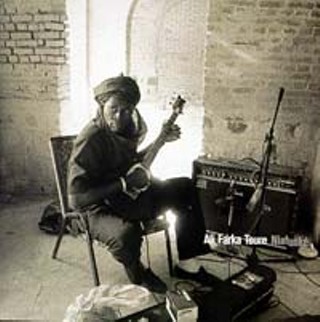Ali Farka Toure and Taj Mahal & Toumani Diabate
Niafunke, and Kulanjan (Hannibal/Rykodisc)
Reviewed by Jay Hardwig, Fri., Sept. 10, 1999


Ali Farka Toure
Niafunke (Hannibal/Rykodisc)
Taj Mahal & Toumani Diabate
Kulanjan (Hannibal/Rykodisc)
Africa is the land where the blues were born. If you've always thought that was just another way of saying that black folks invented it, you've missed the point: American blues has been shot through with African forms from the day the first slave landed his sore and lonely feet on Southern soil. At the end of the 20th century, that particular musical debt is more often acknowledged than heard, but two recent recordings explore both the roots and branches of that quintessentially African-American form. When he first hit the big time in the early Nineties, Saharan guitarist Ali Farka Toure was dubbed "the African bluesman" based on his contemplative style, droning minor key leads, and his collaboration with Ry Cooder. His latest album, Niafunke, finds Toure deep down in Africa: The album was recorded in an abandoned brick hall in Niafunke, Mali, using portable equipment and generators to compensate for the fact that Toure's hometown has no power lines. The result is an album that's moody, elusive, stirring, and yes, bluesy. It's also a damn fine album. A more direct approach is taken on Kulanjan, another Hannibal release that pairs American bluesman Taj Mahal with Mali's Toumani Diabate, known 'round his parts as the meanest kora man in town. Cut in Atlanta in front of a six-piece Malian ensemble, Kulanjan alternates between African tunes and a few Taj staples ("Queen Bee," "Catfish Blues"), each one played at the intersection of Yazoo and Timbuktu. Here too the playing is soulful, dynamic, and finely layered, although at times the endless guitar/kora-riffing threatens to turn Kulanjan into a big bowl of African noodles. No matter: Both are fine albums, making plain an oft-forgotten link in the musical chain.(Niafunke) ![]()
![]()
![]()
![]()
(Kulanjan) ![]()
![]()
![]()










